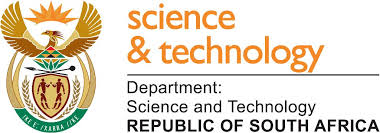Oct 2016 2nd Edition
Oct 2016 2nd Edition Joy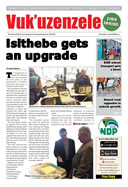
Isithebe gets an upgrade
Isithebe gets an upgrade andileThe Department of Trade and Industry (dti) has launched the first phase of the revitalisation of Isithebe Industrial Park north of KwaZulu-Natal (KZN).
The department invested R49 million into the park as part of its Revitalisation of Industrial Parks programme that aims to revitalise state-owned industrial parks across the country to promote industrialisation, grow the economy and create jobs.
Minister of Trade and Industry Rob Davies and KZN Economic Development, Tourism and Environmental Affairs MEC Sihle Zikalala were at the launch.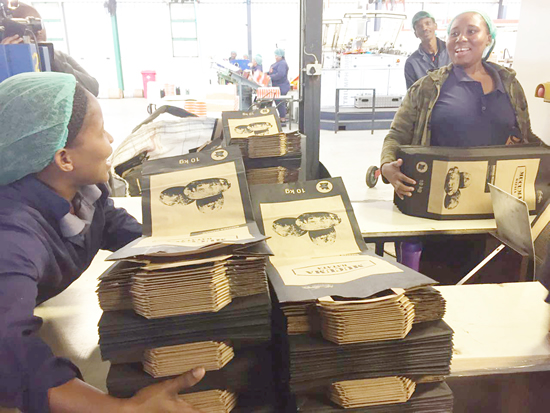
“The first phase includes an upgrade of the security infrastructure, fencing, street lighting and critical electricity requirements. But in the case of Isithebe, we have also upgraded the roofs. Some of the roofs within the industrial park were built in 1971 and were leaking.
“The main reason for the park’s existence is to create employment for the people of that area and promote the growth of small businesses and co-operatives attracting investment and encouraging manufacturing,” he said.
Isithebe is one of the 10 industrial parks that the department has prioritised for revitalisation as part of the programme.
It is the largest industrial park in South Africa, with 205 factories employing over 25 000 people, many of whom are locals.
The industries operating from the industrial park include clothing, textiles, weaving and dying, steel fabrication, furniture
manufacturing, plastic, polypropylene bags, chemicals, paper products and packaging, foundry work, white goods, workshops and engineering, foam manufacturing and conversion, and plastic injection moulding stationery.
Minister Davies said phase two will deal with engineering designs and the construction of new and existing roads, bulk water supply and sewerage treatment plants for industrial effluent control.
Phase three will involve upgrades to the electricity infrastructure and the building of new top structures in line with the expansion of industrial clusters in industrial parks. Phase four will deal with the development of sustainable industrial clusters in industrial parks.
“The dti has recognised that the parks have the capacity to serve as catalysts for broader economic and industrial development in their host region,” said Minister Davies.
MEC Zikalala said the park will grow the economy of the province.
“It also shows that as government we are serious about investment attraction to the province. For us to experience sustained economic growth and to create jobs, industrialisation becomes one of the key focus areas,” he said. 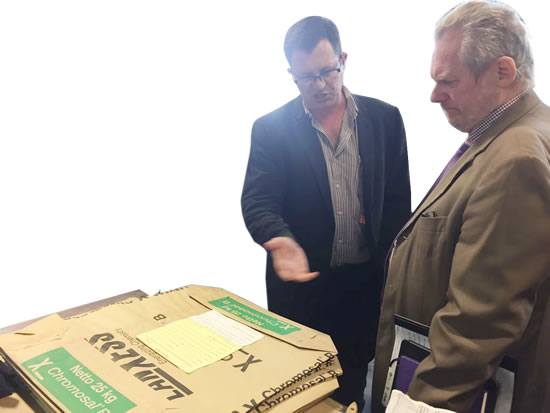
Mandeni Local Municipality Mayor Siphesihle Zulu said the revitalisation of the park brings hope to the people of Mandeni. It was companies from Mandeni that were subcontracted to do roofing and as such, 162 job opportunities were created.
One of the workers at the park’s Taurus Packaging factory, Muzi Mbonambi, said he was happy about the work done at Isithebe Industrial Park.
“I don’t stress for bus fare to go to work. I am sleeping at home every day. I walk only 15 minutes to get to work. “We thank the government for revitalising this industrial park in our community,” he said.
Over 4 700 new artisans for SA
Over 4 700 new artisans for SA andileSouth Africa is working hard to meet the target of training 30 000 artisans a year by 2030.
As part of the skills needed to grow the economy, 4 749 new artisans have qualified through the National Artisan Moderation Body.
Also, 24 324 workplace-based learning opportunities were taken up.
“Artisans possess specialised skills that are sought after by industry and also have the opportunity to become entrepreneurs,” said Science and Technology Minister Naledi Pandor. 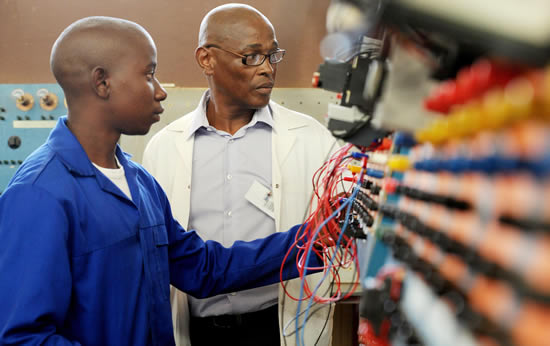
She was briefing media on the work done by the Economic Sectors, Employment and Infrastructure Development Cluster in the implementation of the Programme of Action towards achieving the goals of the National Development Plan: Vision 2030.
The cluster said it is turning things around through the opening of Technical and Vocational Education and Training (TVET) colleges like the Waterberg College, which was opened in June.
“There are another two campus sites at 60 percent completion. Protocols for the secondment of sector specialists to work in TVET colleges have been developed and 329 lecturers have thus far undergone workplace exposure to strengthen the quality of training,” said Minister Pandor.
The cluster also reported that the Expanded Public Works Programme (EPWP) has created 189150 work opportunities.
“The programme has also exceeded the target of employment of women in the programme. A total of 68.3 percent work opportunities for women were created while 1.9 percent were created for people with disabilities.”
A total of 1 550 aquaculture jobs have been created to date and 220 additional jobs are committed for 2016.
Turning to logistics and transport, the cluster said it is continuing with its efforts to maintaining the provincial road networks under the S’hamba Sonke Programme.
Successful roads projects completed included 155 392 m2 of pothole patching completed; 767 kilometres of roads have been re-sealed with 10 355 kilometres of roads re-gravelled; and 76 350 kilometres have been graded.
Internships: DST-NRF Internship Programme 2017/18
Internships: DST-NRF Internship Programme 2017/18 Estelle Greeff|
|
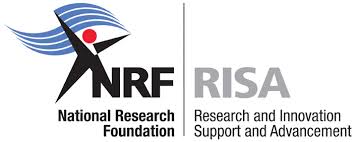 |
The National Research Foundation (NRF) is responsible for the management of the DST-NRF Internship Programme in which unemployed Science, Engineering and Technology (SET) graduates and postgraduates (including those in Social Sciences and Humanities) are offered an opportunity to acquire practical work experience through mentoring and exposure to a research environment. This opportunity is also offered to those unemployed graduates and postgraduates who are interested in research management, research support and administration at public higher education institutions and research agencies through a partnership with the Southern African Research and Innovation Management Association (SARIMA). Applications are invited from candidates who are interested in acquiring work experience in the areas of specialisation or disciplines in the provinces stated below:
Eastern Cape
Areas of Specialisation/Disciplines (choose 1 discipline per province up to a maximum of 3, in order of preference)
- Agricultural Economics
- Agricultural Management
- Agricultural Sciences
- Animal Production
- Animal Science
- Anthropology
- Biochemistry
- Biology
- Botany
- Chemistry
- Communication & Media Studies
- Computer Science
- Computer Software
- Dental Sciences
- Development Studies
- Ecology
- Ecology & Environmental Science
- Education
- Electrical Engineering
- Engineering Sciences
- Epidemiology
- Fisheries
- Food Sciences & Technology
- Fresh Water Biology & Limnology
- Health Promotion & Disease Prevention
- Health Systems Research
- Horticulture
- Industrial Psychology & Sociology
- Information Systems
- Information & Computer Technologies
- Knowledge Management
- Languages & Literature
- Management
- Marine Biology
- Material Sciences & Technologies
- Mechanical Engineering
- Microbiology
- Molecular & Cell Biology
- Nutrition
- Physics
- Physiology
- Plant Production
- Political Sciences
- Political Sciences & Public Policy
- Process Engineering
- Public Health
- Public Management & Administration
- Research Management, Research Support & Administration
- Rural Development
- Social Science
- Social Work
- Sociology
- Soil & Water Sciences
- Sports & Recreational Arts
- Sports Science
- Statistics
- Statistics & Probability
- Zoology
Free State
Areas of Specialisation/Disciplines (choose 1 discipline per province up to a maximum of 3, in order of preference)
- Agriculture
- Agrometereology
- Analytical Chemistry
- Animal Production
- Animal Science
- Anthropology
- Biochemistry
- Civil Engineering
- Development Studies
- Ecology & Environmental Science
- Education
Food Sciences & Technology - Genetics
- Geology
- Home Economics
- Human Geography
- Languages & Literature
- Medical Virology
- Microbiology
- Molecular & Cell Biology
- Musicology
- Pharmacology
- Physiology
- Plant Biotechnology
- Plant Production
- Sociology
- Soil & Water Sciences
- Town & Regional Planning
Gauteng
Areas of Specialisation/Disciplines (choose 1 discipline per province up to a maximum of 3, in order of preference)
- Aerospace & Aeronautical Engineering
- Agricultural Economics
- Agricultural Engineering
- Agricultural Management
- Agriculture
- Agrometeorology
- Analytical Chemistry
- Anatomical Sciences
- Animal Breeding & Genetics
- Animal Production
- Animal Science
- Anthropology
- Applied Mathematics
- Archaeology
- Architecture
- Artificial Intelligence
- Astronomy
- Atmospheric Science & Meteorology
- Biochemistry
- Bio-engineering
- Biological Sciences
- Biology
- Biophysics
- Biostatistics
- Biotechnology
- Botany
- Chemical Engineering
- Chemical Sciences
- Chemistry
- Chemistry Sciences Engineering
- Civil Engineering
- Communication & Media Studies
- Communication Technologies
- Computer Engineering
- Computer Multimedia Systems
- Computer Programming
- Computer Science
- Computer Software
- Demography
- Dental Sciences
- Design Studies
- Development Studies
- Dramatic Arts
- Ecology
- Ecology & Environmental Science
- Education
- Electrical Engineering
- Electronic Engineering
- Endocrinology
- Energy
- Engineering
- Engineering Management
- Engineering Sciences
- Environmental Engineering
- Environmental Health
- Environmental Studies
- Epidemiology
- Fine Arts
- Food Sciences & Technology
- Food Technology
- Forensic Sciences
- Forest Science
- Genetics
- Geographic Information Science (GISc)
- Geographic Information Systems (GIS)
- Geology
- Geophysics
- Haematology
- Health
- Health Economics
- Health Informatics
- Health Promotion
- Health Promotion & Disease Prevention
- Health Systems Research
- Health Technology
- Historical Studies
- Horticulture
- Human Geography
- Hydrology
- ICT
- Immunology
- Industrial Design
- Industrial Engineering
- Industrial Psychology & Sociology
- Information & Computer Sciences
- Information & Library Science
- Information Management
- Information Systems & Technology
- Information Technology
- International Relations
- IT Graphic Design
- Knowledge Management
- Management
- Manufacturing & Process Technologies
- Marine Biology
- Marine Engineering & Navel Architecture Material Sciences & Technologies
- Mathematical Sciences
- Mathematics
- Mechanical Engineering
- Medical Microbiology
- Medical Virology
- Metallurgical Engineering
- Microbiology
- Mining Engineering
- Molecular & Cell Biology
- Natural Sciences
- Neuroscience
- Nuclear Engineering
- Nutrition
- Operations Research
- Paediatrics & Child Health
- Performing Arts
- Pharmacology
- Physical Chemistry
- Physical Geography
- Physics
- Physiology
- Plant Biotechnology
- Plant Production
- Political Sciences
- Political Sciences & Public Policy
- Polymer Science
- Psychology
- Public Health
- Public Management & Administration
- Quality Management
- R&D Psychology
- Research Management with Mathematics
- Research Management, Research Support & Administration
- Rural Development
- Science Education
- Science Journalism
- Social Science
- Social Work
- Sociology
- Soil & Water Sciences
- Space & Earth Science
- Sports Medicine
- Statistics
- Statistics & Probability
- Theology
- Theoretical & Condensed Matter Physics
- Town & Regional Planning
- Toxicology
- Veterinary Science
- Virology
- Zoology
KwaZulu-Natal
Areas of Specialisation/Disciplines (choose 1 discipline per province up to a maximum of 3, in order of preference)
- Agricultural Economics
- Agriculture
- Agrometereology
- Animal Production
- Applied Mathematics
- Archaeology
- Astronomy
- Atmospheric Science & Meteorology
- Biochemistry
- Biological Sciences
- Biology
- Biotechnology
- Botany
- Chemical Engineering
- Civil Engineering
- Communication & Media Studies
- Computer Engineering
- Computer Multimedia Systems
- Computer Programming
- Computer Science
- Cultural Studies
- Dental Sciences
- Earth Science
- Ecology
- Ecology & Environmental Science
- Education
- Electrical Engineering
- Electronic Engineering
- Energy
- Engineering Management
- Environmental Engineering
- Environmental Studies
- Fisheries
- Food Sciences & Technology
- Genetics
- Geochemistry
- Geographic Information Science
- Geology
- Geophysics
- Haematology
- Health Economics
- Health Promotion
- Health Systems Research
- Horticulture
- Hydrology
- Industrial Biotechnology
- Industrial Engineering
- Industrial Psychology & Sociology
- Information & Computer Sciences
- Information & Library Science
- Information Systems & Technologies
- Knowledge Management
- Languages & Literature
- Management
- Marine Biology
- Material Sciences & Technologies
- Mathematics
- Mechanical Engineering
- Medical Microbiology
- Medical Technologies
- Medical Virology
- Microbiology
- Molecular & Cell Biology
- Nutrition
- Organic Chemistry
- Pharmacology
- Physics
- Physiology
- Plant Biotechnology
- Plant Production
- Psychology
- Public Health
- Public Management & Administration
- Rehabilitation Medicine
- Research Management with Mathematics
- Research Management, Research
- Support & Administration
- Social Science
- Social Work
- Sociology
- Soil & Water Sciences
- Space & Earth Science
- Sports Science
- Statistics
- Statistics & Probability
- Sustainable Development
- Veterinary Science
- Virology
- Zoology
Limpopo
Areas of Specialisation/Disciplines (choose 1 discipline per province up to a maximum of 3, in order of preference)
- Agricultural Economics
- Agricultural Engineering
- Agriculture
- Agrometereology
- Animal Production
- Animal Science
- Anthropology
- Biochemistry
- Biology
- Biotechnology
- Botany
- Communication & Media Studies
- Computer Science
- Development Studies
- Ecology & Environmental Science
- Education
- Electronics Engineering
- Food Sciences & Technology
- Forest Science
- Fresh Water Biology & Limnology
- Game Ranching & Farming
- Geology
- Geophysics
- Horticulture
- Human Geography
- Hydrology
- Industrial Psychology & Sociology
- Information & Computer Sciences
- Information & Library Science
- Information Systems & Technology
- Information Technology
- International Relations
- Knowledge Management
- Linguistics
- Mathematics
- Microbiology
- Nutrition
- Nutrition & Metabolism
- Physical Chemistry
- Physical Geography
- Physics
- Physiology
- Plant Production
- Psychology
- Public Health
- Research Management, Research Support & Administration
- Rural Development
- Science Education
- Social Science
- Social Work
- Sociology
- Soil & Water Sciences
- Sports & Recreational Arts
- Sports Science
- Statistics & Probability
- Town & Regional Planning
- Veterinary Nursing
- Zoology
Mpumalanga
Areas of Specialisation/Disciplines (choose 1 discipline per province up to a maximum of 3, in order of preference)
- Agricultural Economics
- ICT
- Physical Geography
- Research Management, Research Support & Administration
- Zoology
Northern Cape
Areas of Specialisation/Disciplines (choose 1 discipline per province up to a maximum of 3, in order of preference)
- Botany
- Ecology & Environmental Science
- Science Education
North West
Areas of Specialisation/Disciplines (choose 1 discipline per province up to a maximum of 3, in order of preference)
- Agriculture
- Biochemistry
- Biological Sciences
- Biostatistics
- Biotechnology
- Chemistry
- Civil Engineering
- Construction Industry & Building
- Demography
- Diabetology
- Epidemiology
- Forest Science
- Genetics
- Health
- Health Promotion & Disease Prevention
- Health Systems Research
- Information Systems & Technologies
- Knowledge Management
- Mathematical Sciences
- Microbiology
- Neuroscience
- Nursing Science
- Nutrition
- Physics
- Plant Production
- Psychology
- Public Health
- Public Management & Administration
- Research Management, Research Support & Administration
- Social Work
- Soil & Water Sciences
Western Cape
Areas of Specialisation/Disciplines (choose 1 discipline per province up to a maximum of 3, in order of preference)
- Aerospace & Aeronautical Engineering
- Agricultural Engineering
- Agricultural Management
- Agriculture
- Analytical Chemistry
- Anthropology
- Applied Mathematics
- Archaeology
- Astronomy
- Atmospheric Science & Meteorology
- Biochemistry
- Bio-engineering
- Biological Sciences
- Biology
- Biomedical Technolog
- Biostatistics
- Biotechnology
- Botany
- Cardiovascular Diseases
- Chemical Engineering
- Chemistry
- Communication & Media Studies
- Computer Programming
- Computer Science
- Computer Software
- Construction Industry & Building
- Development Studies
- Diabetology
- Ecology
- Ecology & Environmental Science
- Education
- Electrical Engineering
- Electronic Engineering
- Energy Efficiency
- Engineering
- Environmental Engineering
- Environmental Health
- Environmental Studies
- Epidemiology
- Food Sciences& Technology
- Forensic Sciences
- Fresh Water Biology & Limnology
- Genetics
- Genito-urinary Diseases
- Geographic Information Systems (GIS)
- Geology
- Geospace Physics
- Haematology
- Health Economics
- Health Informatics
- Health Promotion
- Health Promotion & Disease Prevention
- Health Systems Research Health Technology
- Horticulture
- Human Geography
- Hydrology
- Immunology
- Industrial Engineering
- Industrial Psychology & Sociology
- Information & Computer Sciences
- Information & Library Science
- Information Systems
- Information Systems & Technology
- Management
- Manufacturing & Process Technologies
- Marine Biology
- Material Sciences & Technologies
- Mechanical Engineering
- Medical Biotechnology
- Medical Virology
- Mental Health & Substance Abuse
- Microbiology
- Molecular & Cell Biology
- Morphology
- Natural Sciences
- Neuroscience
- Nutrition
- Nutrition & Metabolism
- Oceanology
- Organic Chemistry
- Paleontology
- Particle & PlasmaPhysics
- Pharmacology
- Phenomenological Physics
- Physical Geography
- Physics
- Physiology
- Plant Biotechnology
- Political Sciences
- Psychology
- Public Health
- Public Management and Administration
- Quality Management
- R & D Psychology
- Research Management, ResearchSupport & Administration
- Science Education
- Science Journalism
- Social Science
- Social Work
- Sociology
- Soil & Water Sciences
- Space & Earth Science
- Sports & Recreational Arts
- Sports Medicine
- Sports Science
- Statistics
- Statistics & Probability
- Sustainable Development
- Toxicology
- Virology
- Zoology
Qualifications
Only university graduates with Bachelor’s, Honours, BTech, MTech or Master’s degrees will be considered (people holding a National Diploma, DTech and PhD need not apply).
Remuneration
Interns will receive a monthly salary ranging between R6 070 and R8 050 per month, depending on the level of qualification.
Who is eligible to apply?
Unemployed South African university graduates and postgraduates in the Science, Engineering and Technology (SET), Research and Development, Social Sciences and Humanities fields are eligible. South African Permanent Residents who hold a South African Identity Document also qualify, while non-South Africans are not eligible. Applicants should not be older than 35 years at the time of submission of an application to qualify. Candidates with disabilities are encouraged to apply.
Shortlisting and interviews
Shortlisting and interview of applicants will be conducted by the participating host institutions. Applicants will be shortlisted and called for interviews via their personal e-mails listed in the application. Applicants are advised to check their e-mails intermittently from December 2016 to 31 March 2017.
Placement will be at various institutions
Successful applicants will be placed at various participating institutions throughout the country and should thus apply for a position available in the province where they would like to be placed. The NRF does not pay relocation costs to an appointed candidate who has to relocate to another province.
Duration
The internship programme is offered for a period of 12 months. Successful applicants will be required to sign an internship contract for the duration of the internship period.
How to apply
All applications must be submitted electronically on the NRF Online Submission System at https://nrfsubmission.nrf.ac.za Register and then log in, go to “My applications” and create an application and then “Internship Programme Applicants 2017” and apply there following instructions. Please also attach certified copies of qualifications, academic records and a copy of the South African Identity Document. Please note that you may only apply for a maximum of 3 disciplines in order of preference across all provinces.
Enquiries
For technical online enquiries, please contact the Support Desk (Mondays to Fridays from 08:00 to 16:30) at (012) 481-4202 or supportdesk@nrf.ac.za For programme-related queries, contact Sello Raseruthe at (012) 481-4388 or sello.raseruthe@nrf.ac.za and Monwabisi Mfihlo at (012) 481-4023 or monwabisi.mfihlo@nrf.ac.za
Closing date: 7 November 2016. No late applications will be considered.
NB: Correspondence will be limited to shortlisted candidates only. If no correspondence has been received 4 months after the closing date, applicants should consider their applications unsuccessful. Successful applicants will start their internships on 1 April 2017.
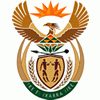
News in brief
News in brief andileCongratulations Brad Binder
North West Premier Supra Mahumapelo has congratulated 21-year-old Brad Binder on winning the Moto3 World Champion title. Binder, who hails from Potchefstroom in Tlokwe Local Municipality, won the competition, which was held in Aragon, Spain, recently. Binder, a motorcycle racer, rose to stardom in the world of Moto GP by becoming the first South African rider to win a Grand Prix title in 36 years.
SA urged to take part in health survey
Statistics South Africa is appealing to South Africans to open up their doors to fieldworkers who are conducting the South African Demographic and Health Survey. The survey seeks to highlight areas that require health intervention from government and other non-governmental organisations. The survey collects data from 15 000 sampled dwelling units between June and November 2016 and asks a wide range of questions on health, fertility, nutrition and family planning, among others.
All systems go for Grade 12 exams
The Department of Basic Education says it's all systems go for this year’s Grade 12 National Senior Certificate examinations. The examinations will take place from 25 October - 29 November. The Minister of Basic Education will announce the outcome of the 2016 Grade 12 exams on January 4, 2017. Candidates will collect their statements of results on January 5 at the place where they wrote their examination. There are 677 141 registered full-time and 150 183 part-time candidates in the 2016 examinations, 9 000 more than 2015.
Moving South Africa forward
Moving South Africa forward andile
Participating recently in the yearly United Nations General Assembly (UNGA) in New York I was struck once again by the range of issues confronting humanity across the globe, from armed conflict and the challenges of climate change, to radicalisation and extremism.
From South Sudan, Yemen and Libya on our own continent, to Syria, Iraq, Afghanistan, the Middle East, North Korea and the Ukraine, the world faces instability, conflict and insecurity that threatens and should concern all of humanity.
The 2016 UNGA brings to mind the prominence with which our own country featured on the global agenda during the years of apartheid.
Forty years ago, in 1976, the United Nations General Assembly responded strongly to the plight of black South Africans following the Soweto Youth Uprising and similar explosions of resistance and anger elsewhere in our country.
One of the 1976 UNGA resolutions called on UN member states and the global organisation’s specialised agencies to help Lesotho and other countries bordering South Africa provide educational facilities to the rapidly growing number of refuge students from South Africa.
The resolution expressed the UN’s concern about the large number of South African students fleeing to Botswana, Lesotho and Swaziland, “imposing a heavy burden on the limited resources and employment opportunities of these countries”.
Looking back over this history reminds us how deep the legacy of apartheid runs in our country. The South Africa of 1976 is not the South Africa of 2016 where international companies freely invest and subscribe to the values of our democratic system. 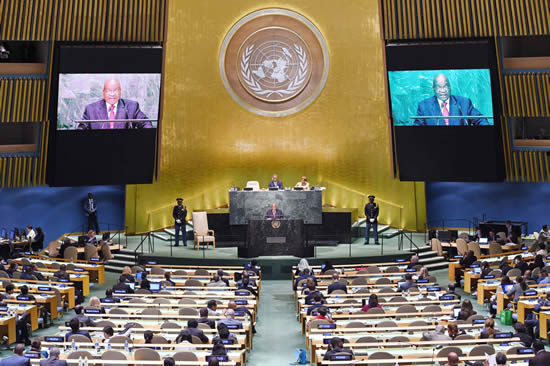
In 2016, as we undo the apartheid legacy, we find ourselves in a South Africa where organisations such as the Black Business Council, the Black Management Forum and others continue to wage a struggle to make our economy fully inclusive.
For any economy to succeed, the majority of the citizens must play a meaningful role, beyond being workers. They must participate also as owners, executives and senior managers and also as policy makers in the economy.
This is the motivation behind government’s policies on broad-based black economic empowerment which must be embraced by the public and private sectors.
Government knows that for broad-based black economic empowerment to succeed in the public sector, we must use our procurement muscle to sustain and grow black businesses.
Annually, through the public sector procurement system, government spends around R500 billion on goods and services and construction work alone.
The buying power of the state is therefore a powerful tool that must be used to advance black economic empowerment.
To take this further, government is working to repeal a law and regulations that uses a system of BEE preference points on which firms doing business with government are rated.
We have found this not to work, as it has done little to change the skewed ownership and control of the South African economy.
One of the main changes contained in the proposed new Preferential Procurement Regulations is the introduction of a compulsory sub-contracting clause.
It will be compulsory to sub-contract a minimum of 30 percent of the value of the contract for all contracts above R30 million, to small and emerging enterprises owned by women, youth, black people or persons with disability.
One of the biggest challenges facing black businesses and the implementation of our empowerment policies is access to finance.
To address this, we created the National Empowerment Fund (NEF) to financially support empowerment initiatives. Since its inception, approvals by the NEF have totaled R7.6 billion, supporting 770 black businesses.
For the 2015/16 financial year, the NEF has approved 120 worth R1.3 billion.
The Industrial Development Corporation (IDC) has provided R31 billion over the past five years to companies that are black-empowered. The IDC has also allocated R23 billion to the relatively new black industrialist programme.
In its first year of roll-out, the Department of Trade and Industry has approved 22 Black Industrialist projects with a total value of R1.2 billion. Over 1 000 direct jobs have been supported.
This is how we are moving South Africa forward in 2016, reversing day by day the effects of a South Africa that gave the UN General Assembly and the global community headaches back in 1976.
We remain grateful for the international solidarity that helped to bring us to where we are today.
City Power lights up homes
City Power lights up homes nthabiLocal government
The arrival of more people in the City of Johannesburg seeking economic opportunities puts pressure on the electrical infrastructure of the City.
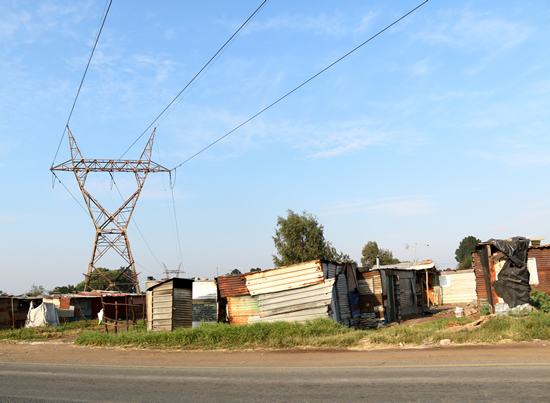 Statistics show that 10 000 migrants arrive in the City every month from different parts of the country and the continent to seek better economic opportunities.
Statistics show that 10 000 migrants arrive in the City every month from different parts of the country and the continent to seek better economic opportunities.
Currently, there are 181 informal settlements across Johannesburg with an estimated 180 000 households and a combined population exceeding 500 000.
According to City Power Managing Director Sicelo Xulu informal settlements account for 13 percent of power losses in Johannesburg as a result of illegal electricity connections.
City Power is an agency of the City of Johannesburg.
As part of the a bigger picture to formalise informal settlements, the City has been installing independent power grids and using an energy hybrid mix of solar power and gas stoves at Setjwetla, near Alexandra, in Region E and Thembelihle and Lawley Station in Region G.
The electrification of informal settlements aims to stop unnecessary electrocutions, restore people’s dignity, regularise power supply and prevent the loss of revenue caused by illegal connections.
During the winter season, “Since 2013, City Power has exceeded its targets of 2 000 new connections each year.” residents living in informal settlements often lose their lives in devastating fires caused by hazardous cooking and heating appliances.
“The electrification of these settlements will ensure that communities are saved from these tragic incidents and will also help reduce incidents of crime that happens because of the previous lack of efficient lighting.”
Xulu said the project will also help to reduce illegal electricity connections and assist in preventing load-shedding. City Power has electrified 17 675 households located in 10 communities in rural areas. Since 2013, City Power has exceeded its targets of 2 000 new connections each year.
The provision of reliable public lighting contributes towards safety in communities. City Power says it is proud to have commissioned a total of 25 744 public lights in Joburg and the City’s informal settlements.
The utility has also developed a free load-limiting mobile app, aimed at providing residents with a convenient solution to inform residents about load-limiting schedules.
The load-limiting app also allows residents to turn off unnecessary appliances from wherever they are, whether at work, university or while out and about. The app works on most cell phones with Android and iOS software.
*Hloni Motloung works for City Power.
Uplifting communities
Uplifting communities nthabiLocal government
City Power, is doing its part to empower communities in and around the city.
 To date, City Power has created over 17 000 jobs through the Expanded Public Works Programme (EPWP). Managing Director of City Power Sicelo Xulu says this is in line with the Gauteng Growth and Development Strategy, which is aimed at addressing challenges facing the province, such as the high rate of unemployment.
To date, City Power has created over 17 000 jobs through the Expanded Public Works Programme (EPWP). Managing Director of City Power Sicelo Xulu says this is in line with the Gauteng Growth and Development Strategy, which is aimed at addressing challenges facing the province, such as the high rate of unemployment.
One of the initiatives the agency is using to address unemployment is Jozi@Work. Through the initiative, City Power has also developed a number of programmes that call for the participation of SMMEs and the community. The utility’s focus with Jozi@Work is on skills development, SMME development, taking care of the environment and job creation.
Jozi@Work is a programme designed to create an opportunity for communities to partner with the City in the delivery of municipal services in their own neighbourhoods.
“City Power’s vision for Jozi@Work is to contribute towards sustainable local development, to positively impact communities through using City Power’s procurement budget and services to provide socio-economic opportunities for local communities, and to provide opportunities within City Power for communities,” said Xulu.
To further empower young people, City Power awarded bursaries to students to pursue a range of studies including BSc Electrical Engineering, B.Com Accounting and National Diploma Electrical Engineering.
The graduates have undergone training and mentorship programmes, together with the South African Institute of Electrical Engineers. A Learning Academy was also launched in December 2012, within City Power. It is accredited by the Energy and Water Sector Education and Training Authority, for the City Power cable jointing training. This will also enable City Power to provide cable jointing training to the private sector.
*Hloni Motloung works for City Power.
Govt providing decent shelter
Govt providing decent shelter nthabiLocal government
About 70 000 people from the Sedibeng District Municipality in Gauteng will receive decent houses as part of government’s drive to provide integrated human settlements.
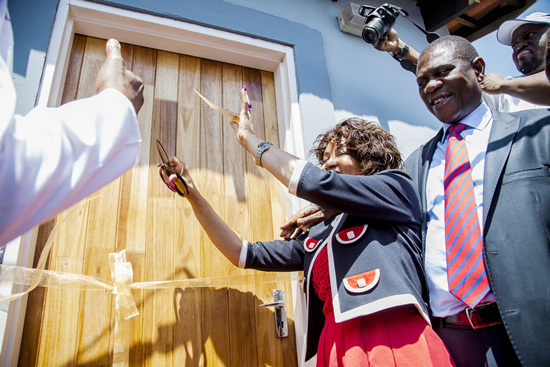 Human Settlements Minister Lindiwe Sisulu and the Gauteng MEC for Human Settlements Paul Mashatile handed over houses worth R24 billion at the Savanna City Housing project in the Sedibeng District Municipality.
Human Settlements Minister Lindiwe Sisulu and the Gauteng MEC for Human Settlements Paul Mashatile handed over houses worth R24 billion at the Savanna City Housing project in the Sedibeng District Municipality.
“We are here at Savanna City to witness the handover of phase 1 of Breaking New Ground (BNG) houses, an integrated human settlement development which will finally consist of more than 18 000 BNG houses, providing decent shelter to more than 70 000 people once completed,” said Minister Sisulu.
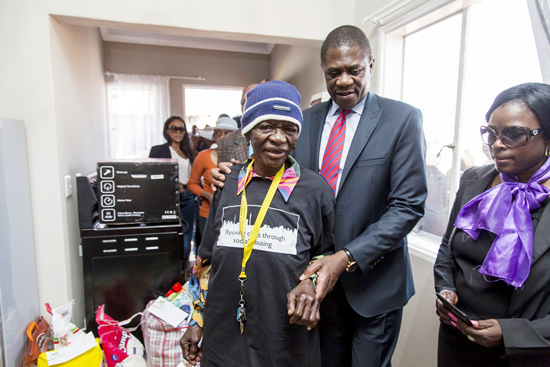 As part of phase 1, the Department of Human Settlements handed over 497 fully-subsidised houses which will pave the way for the construction of phase 2, which is expected to deliver more than 1 600 houses by the end of March 2017.
As part of phase 1, the Department of Human Settlements handed over 497 fully-subsidised houses which will pave the way for the construction of phase 2, which is expected to deliver more than 1 600 houses by the end of March 2017.
Minister Sisulu said Gauteng has a target to deliver 50 000 housing units by the end of this financial year.
“These families here today join more than 600 community members who have already made Savanna City their home, thanks to the government Financed Linked Individual Subsidy Programme.”
The minister said over 1 500 job opportunities were created during the construction of phase 1 and more opportunities are expected to be created as the construction continues.
Savanna City is one of the Department of Human Settlements’ integrated projects and it includes at least three municipalities, the District of Sedibeng, Midvaal and Johannesburg.
The minister applauded the private sector for their support throughout the years.
“Without the private sector’s much-needed support we would not have provided decent shelter to more than 20 million South Africans. We thank individual South Africans for their financial support through their tax payments that continue to enable us to restore dignity through human settlements.”
She said to this end, government has launched a number of pilot projects since 2005 across all major cities, including Cosmo City and Fleurhof in Johannesburg and Olievenhoutbosch in Tshwane. Of the 4,3 million houses and subsidies delivered since 1994, Gauteng has contributed over a million houses and subsidies, providing adequate shelter to over 4 million people.
Mayoral bursary applications open
Mayoral bursary applications open nthabiLocal government
The Rand West City Local Municipality is continuing with efforts to change the lives of young people in Randfontein and Westonaria.
The municipality has opened applications for the Mayoral bursary for the 2017 academic year. Applications will be open until 25 November this year. Students living in Randfontein and Westonaria are urged to apply for the bursary scheme which has already benefited scores of young people over the years.
With R3 million having been set aside for the scheme for the 2017 academic year, the bursary will cover tuition fees as well as the study material required.
Rand West City Local Municipality spokesperson Tshidiso Tlharipe said the bursary scheme aims to give young people the opportunity to have a brighter future.
“The Rand West City Local Municipality values education and we want to ensure that access to educational opportunities continues to be simplified to unleash young people’s potential.
“Most of our graduates have been able to secure employment in the mining sector in our region as well as other government departments and private businesses.”
“Most of our graduates have been able to secure employment in the mining sector in our region as well as other government departments and private businesses,” said Tlharipe.
To qualify, one has to be a South African citizen; have a university exemption pass or an average of 60 percent pass; reside within the Rand West City jurisdiction, and if not, their parents are expected to be staying within that jurisdiction.
The scheme is open for those who wish to study in the academic disciplines of engineering, medical and health sciences, commercial and financial sciences as well as legal and agri-business.
This year alone, the Rand West City Local Municipality, which was functioning as Randfontein Local Municipality prior to being merged with Westonaria during this year’s Local Government Elections, was able to send more than 50 applicants to school, thus continuing to echo the sentiments of the Freedom Charter that the doors of learning and culture shall be open to all.
For more information pupils within that region are advised to visit the municipal offices in Randfontein or call: 011 411 0000.
New schools for SA learners
New schools for SA learners nthabiThe Department of Basic Education’s drive to ensure that learners have access to decent education is bearing fruit.
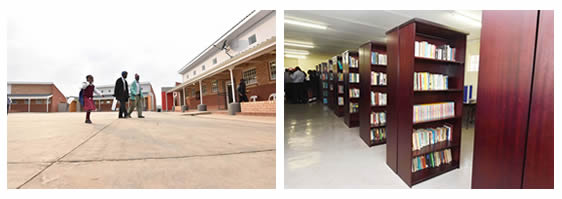 Through its Accelerated Schools Infrastructure Development Initiative (ASIDI), the department has been unveiling state-of-the-art schools every week across the country.
Through its Accelerated Schools Infrastructure Development Initiative (ASIDI), the department has been unveiling state-of-the-art schools every week across the country.
Recently, the department handed over the cutting edge Lucingweni Primary School on the outskirts of Mthatha, in the Eastern Cape, which cost R29 million to construct.
While in the North West the MEC of Public Safety Dr Mpho Motlhabane also handed-over Toevlug Primary School, a state-of-the-art facility worth R37 million, to the community of Toevlug.
During the official handover, MEC Motlhabane urged members of the community to ensure that the school becomes a centre of excellence.
“Government has made this investment in this community, it is now up to you to double that investment by ensuring this school is kept in this beautiful state.”
Since the programme’s inception, the initiative has led to the completion of just over 170 schools out of a targeted 510 around the country, with 126 of them situated in the Eastern Cape.
Provincial education departments continue to deliver services such as water, sanitation, electricity and other resources through the Education Infrastructure Grant. Although there remains a backlog, progress is being made to address infrastructure challenges.
The department also stated that the schools, which are mainly constructed in rural and underprivileged urban areas, come standard with a science lab, computer lab, media centre, rain water harvesting tanks, nutrition centre and fully-functional administration block with offices and staff room.
“All ASIDI schools meet the minimum norms and standards and, in some cases, exceed these requirements.”
All ASIDI schools meet the minimum norms and standards and, in some cases, exceed these requirements.
The programme also includes a basic services component over and above the school-building programme. To this end, an additional 615 schools have been provided with water, 418 with decent sanitation and 307 with electricity.
KZN school transport gets a boost
KZN school transport gets a boost nthabiA percentage of KwaZulu-Natal (KZN) learners no longer have to struggle to get access to education. The KZN Department of Transport has allocated R186 million for scholar transport during the 2016/17 financial year.
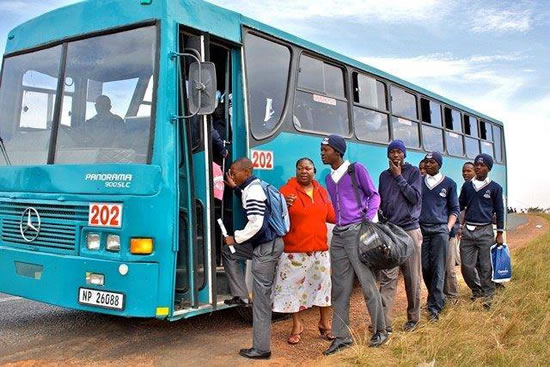 This will benefit more than 45 000 learners attending over 300 schools throughout the province.
This will benefit more than 45 000 learners attending over 300 schools throughout the province.
Speaking to Vuk’uzenzele, MEC for Transport Mxolisi Kaunda said this still falls short of meeting the demand for scholar transport, which is provided to needy and mostly rural-based learners travelling more than three kilometres to their
nearest schools.
“For the province to cover its priority-need learners, it would require an estimated R50 billion budget – a far cry from the current R186 million. However, government has also provided 12 305 bicycles to needy learners over the past five years, and will be distributing a further 15 000 bicycles in the next five years,” said MEC Kaunda.
Education MEC Mthandeni Dlungwane said government would continue to provide scholar transport as it forms part of government’s key priority of access to education.
The total number of schools that will benefit from the learner transport programme is 320 and the total number of learners is 46 051. Grade 12 learner Lungisile Mzoneli said she is happy about the transport that government has provided.
“Before this transport programme, we were using public transport. If there was a taxi strike, we would miss school but with this transport programme, we are
always on time for school,” she said.
The total number of schools that will benefit from the learner transport programme:
| Number of schools per district | Number of learners | |
| Zululand | 31 | 4626 |
| Uthukela | 30 | 4755 |
| Amajuba | 32 | 2889 |
| Umzinyathi | 37 | 4255 |
| Sisonke | 30 | 2524 |
| Ugu | 26 | 3009 |
| Umlazi | 28 | 4162 |
| Uthungulu | 24 | 5000 |
| Umkhanyakude | 27 | 4426 |
| Umkhanyakude | 24 | 4836 |
| Umgungundlovu | 31 | 5569 |
Advertorial: #Education4thepoor
Advertorial: #Education4thepoor Estelle Greeff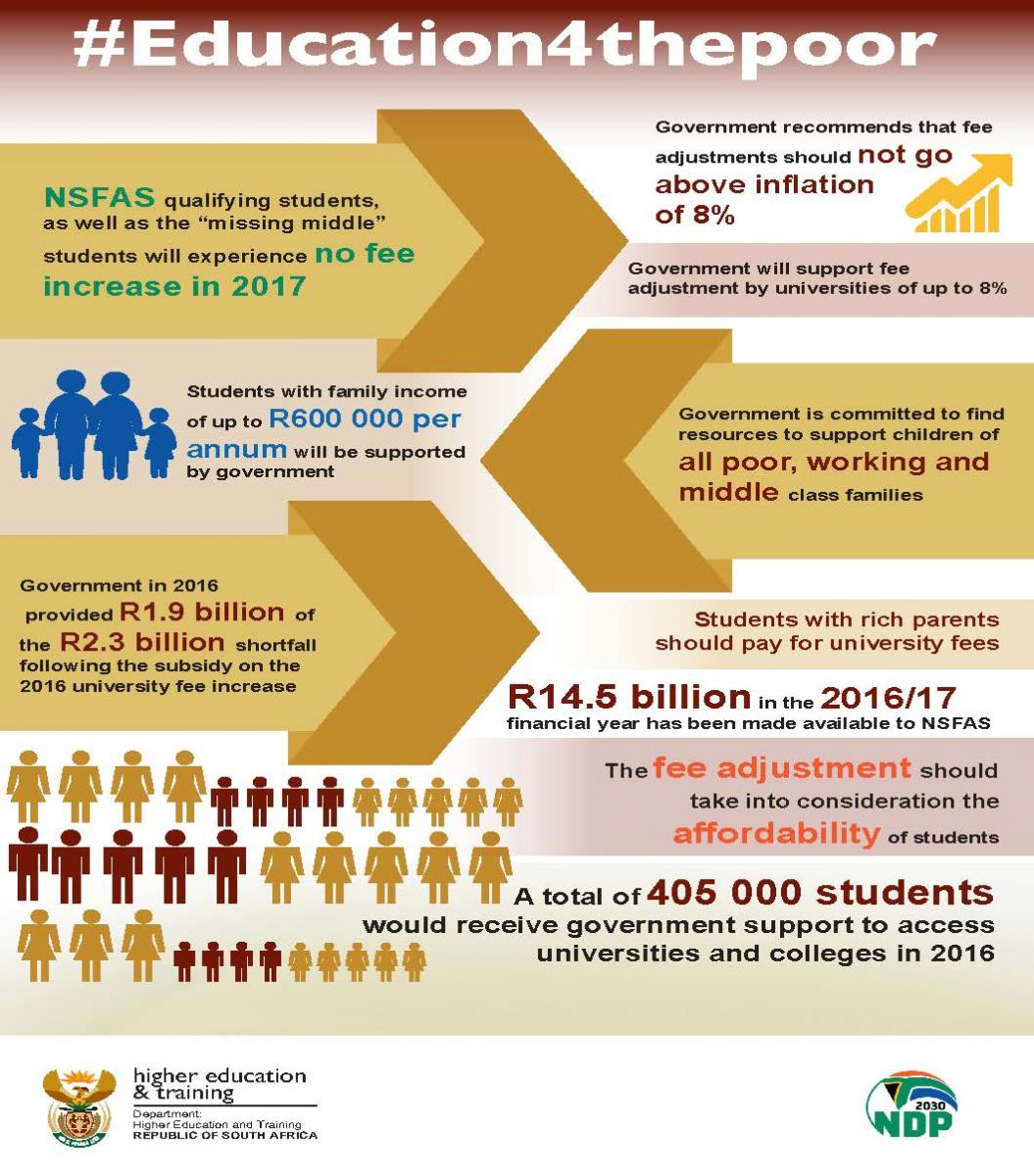
Safe, reliable transport for all
Safe, reliable transport for all lebangTransport Month
The transport sector is at the heart of the country’s development and it is Minister of Transport Dipuo Peters’ duty to ensure that it accommodates everyone.
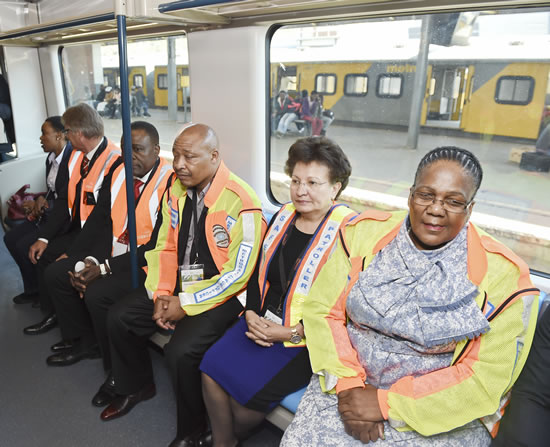 “I have the duty of ensuring that South Africans have safe, reliable, affordable and convenient public transport,” said the Minister.
“I have the duty of ensuring that South Africans have safe, reliable, affordable and convenient public transport,” said the Minister.
The Department of Transport has a bearing on almost every aspect of people’s daily lives.
“People need transport and roads to go to work, business, church, parties, holidays, shops and to socialise. The department has a huge task of ensuring that infrastructure is maintained, upgraded and built, in addition to providing a safe, reliable, affordable and convenient transport system.”
Speaking to Vuk’uzenzele about Transport Month, which is commemorated in October, Minister Peters said her department intends showcasing transport infrastructure projects, promoting the use of public transport and advancing road safety initiatives.
This year’s Transport Month theme is “Together we Move South Africa Forward”.
“Government is investing in the transport sector which is part of the country’s Nine-Point Plan to stimulate development and create jobs.”
She added that the country’s investment in transport will help grow the economy and address the challenges of unemployment, poverty and inequality.
Meanwhile, Minister Peters said her department is supporting the Passenger Rail Agency of South Africa to ensure that passenger rail plays a leading role in the transport system.
“The Rolling Stock Fleet Renewal Programme is our big programme currently.”
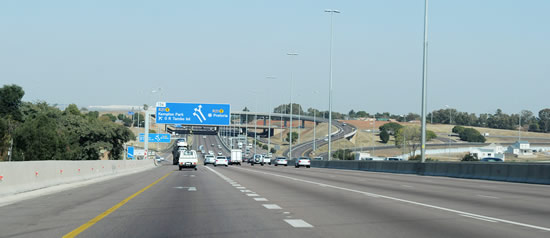 The department has already invested R172 billion in this programme and as a result, five new modern passenger trains have already been delivered. The sod-turning ceremony for the factory that will build new trains locally took place in Ekurhuleni in March.
The department has already invested R172 billion in this programme and as a result, five new modern passenger trains have already been delivered. The sod-turning ceremony for the factory that will build new trains locally took place in Ekurhuleni in March.
The factory will ensure that 65 percent of the trains used in the country are built locally and will create about 65 000 jobs.
“The local manufacture of new trains will see the skilling of approximately 19 527 individuals over the next 10 years,” she added. This will include artisans, engineers, train drives, designers and technicians.
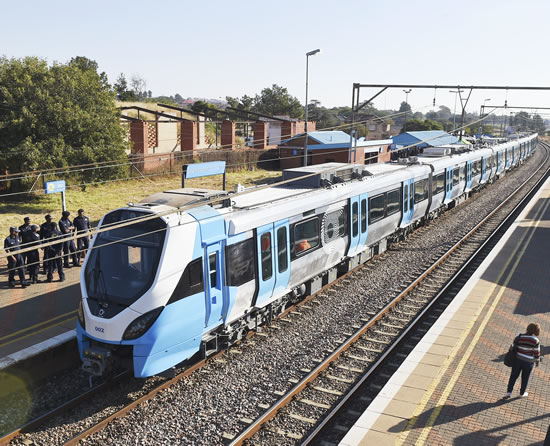 South Africa’s maritime industry has been identified as a key driver of the economy and forms part of government’s Operation Phakisa, which aims to fast track service delivery in various sectors of the economy in collaboration with the private sector, academia and civil society.
South Africa’s maritime industry has been identified as a key driver of the economy and forms part of government’s Operation Phakisa, which aims to fast track service delivery in various sectors of the economy in collaboration with the private sector, academia and civil society.
“Since the inception of Operation Phakisa: Oceans Economy, over 4 500 jobs have been created in the various sectors,” said the Minister.
Other developments in the maritime industry include the establishment of the South African International Maritime Institute (SAIMI) in partnership with the Nelson Mandela Metropolitan University and the South African Maritime Safety Authority, to facilitate the development of the skills and knowledge base required to ensure the success of maritime economic development initiatives.
365-day Road Safety Programme on the cards
365-day Road Safety Programme on the cards lebangTransport Month
The Department of Transport and its roads agencies are in the process of developing a 365-day road safety programme that will be sustainable and run consistently.
Minister Dipuo Peters said the programme is expected to address various road user groups, ranging from pedestrians, passengers, scholar groups and drivers.
In addition, a Ministerial Task Team consisting of officials from the Department of Justice, the National Prosecuting Authority and the Road Traffic Management Corporation has been established.
The task team will consider the possibility of introducing a minimum sentence for extremely serious traffic violations such as excessive speeding, reckless and negligent driving and driving under the influence of alcohol, explained the Minister.
Sanral road upgrades to unlock growth
Sanral road upgrades to unlock growth lebangTransport Month
The national roads network, which spans the length and breadth of South Africa, plays an important role in the economy.
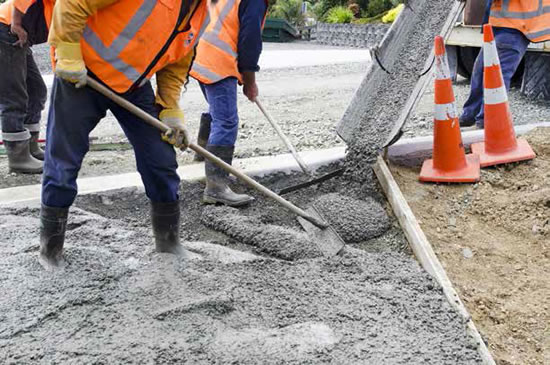 Over the years, the length of the network has increased significantly. In April 1998, the South African National Road Agency Limited (SANRAL) managed 6 622km of national roads. By 1 September 2016, the length had increased to 21 946km.
Over the years, the length of the network has increased significantly. In April 1998, the South African National Road Agency Limited (SANRAL) managed 6 622km of national roads. By 1 September 2016, the length had increased to 21 946km.
As the network increases, so too does the need for maintenance, said Minister of Transport Dipuo Peters, under whom SANRAL falls.
She said there is a general lack of infrastructure maintenance by all sectors of society.
“We must change this mentality, whereby we see government, private business and every individual adopting a renewed mind-set in looking after the infrastructure we currently have.”
Government is hard at work upgrading and refurbishing roads across the country. Currently, the N3 is being upgraded from Durban to Cedara outside Pietermaritzburg.
Upgrading of the N3 is essential as one of government’s strategic integrated projects linking the Port of Durban with Gauteng, South Africa’s economic heartland. It is currently the busiest road freight corridor in South Africa.
In the Eastern Cape, SANRAL had completed road infrastructure to the value of R1.4 billion at the close of the 2015/16 financial year.
Minister Peters said the N2 Wild Coast Toll Road project will unlock higher levels of prosperity.
“With the full support of local communities and traditional leadership of the Mpondo kingdom, we have the consent and support of the people to put roads in place that will have a snowball effect on tourism, agriculture and public infrastructure such as schools and hospitals,” she said.
Moloto Road will also be upgraded as part of the Moloto Road Development Corridor, initiated by government, which will also include the much-needed investment in passenger rail to offer commuters a safer, faster and more accessible connection between Mpumalanga and Gauteng.
The upgrade will take five years to complete, totalling approximately R4.5 billion. The project spells job opportunities for locals from within the districts and municipalities in the area.
In addition, people will be trained in various aspects of engineering. Minister Peters confirmed that the Moloto Road project will create about 5 500 jobs.
The N1 Ring Road in Musina will soon experience much-improved journeys following major improvements to the N1 freeway.
SANRAL is to build a ring road around the town. The 30-month construction project commenced in early 2016.
The value of the project is set at R700 million and about R85 million of the work will be undertaken by small and emerging enterprises, creating an estimated 200 local jobs.
Supplied by: The Department of Transport.
Dredging simulator an African first
Dredging simulator an African first lebangTransport Month
The Transnet National Ports Authority (TNPA) has launched Africa’s first dredging simulator at the Port of Durban.
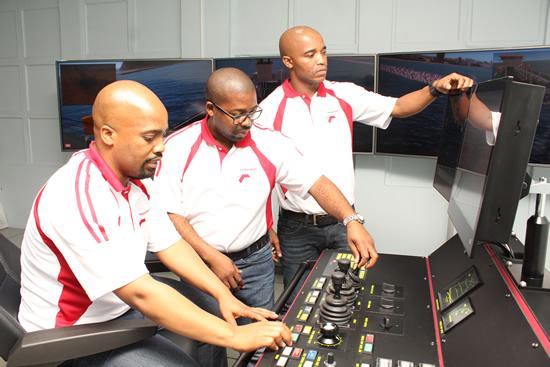 The dredging simulator, which cost R29 million, will be based at the Maritime School of Excellence in Durban. The simulator mimics the control panel of an actual dredging vessel, complete with environment simulation of weather conditions, sea states and types of soil being dredged.
The dredging simulator, which cost R29 million, will be based at the Maritime School of Excellence in Durban. The simulator mimics the control panel of an actual dredging vessel, complete with environment simulation of weather conditions, sea states and types of soil being dredged.
The simulator should provide practice that will ultimately reduce accidents and even loss of life.
More than 50 youth stand to benefit from this launch and the simulator will help hone critical technical skills needed for pipe operators, dredge masters and dredging managers.
TNPA Chief Executive Officer Richard Vallihu said the Maritime School of Excellence will train at least 50 young people over a three-year period.
The dredging school will become one of the four schools worldwide that trains people in all aspects of dredging. The training is expected to start in January 2017. After the learnership, trainees will specialise in one of the following marine and ports vocations: Marine Hydrography Surveyors, Dredge Masters, Chief Master Engineers, Dredging Managers and Naval Architects.
Vallihu said the facility will help TNPA to support ports in Southern Africa to develop maritime skills and grow their economies.
A number of regional ports are ramping up plans to expand port capacity, which will require major dredging projects. “We would like to be in a position to provide human capacity for that,” he said.
One of Transnet’s simulation facilitators, Thami Khanyile, said Transnet gives equal opportunities to every South African. “Young people should grab opportunities like this because they are very rare to find,” he said.
Learnership will be advertised in all regional newspapers.
More information is available on: www.transnet.net or call 031 361 2346.
Advertorial - SANRAL
Advertorial - SANRAL Estelle Greeff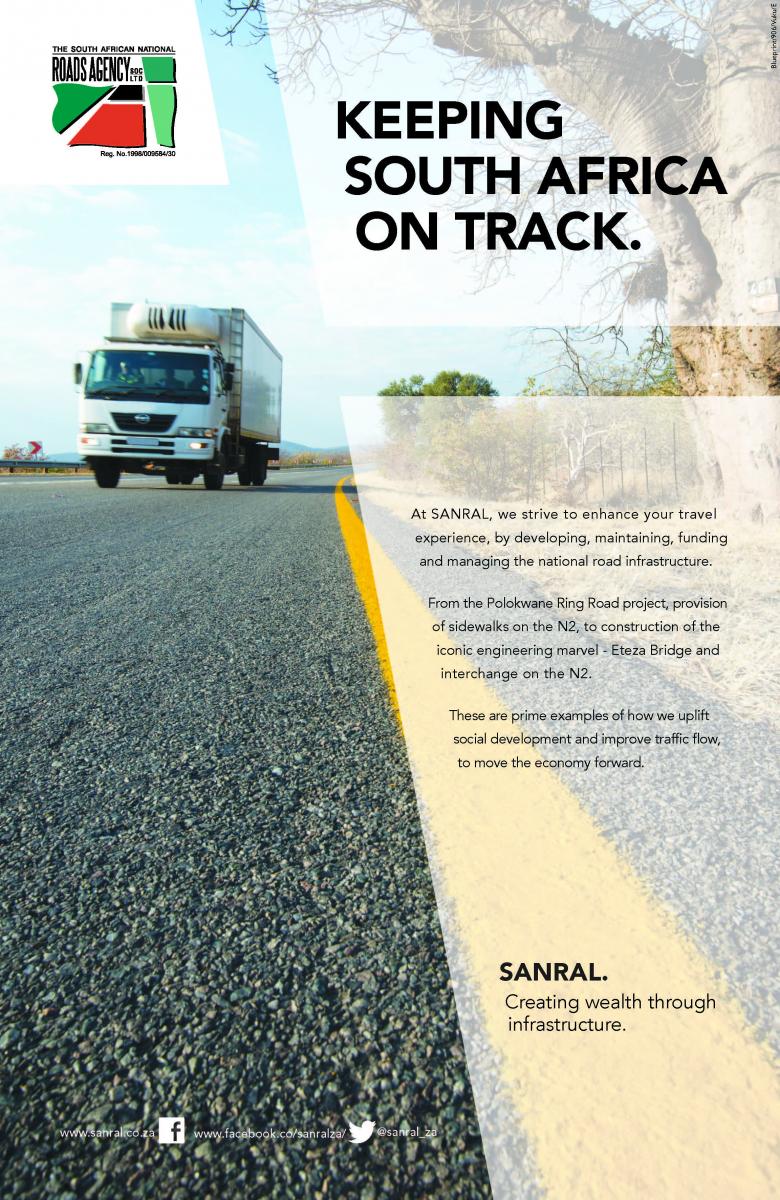
New psychiatric hospital for NW
New psychiatric hospital for NW Estelle GreeffNorth West Premier Supra Mahumapelo says the new Bophelong Psychiatric Hospital built in Mahikeng (formerly Mafikeng) will help tackle the stigma associated with mental health and provide the highest standards of care.
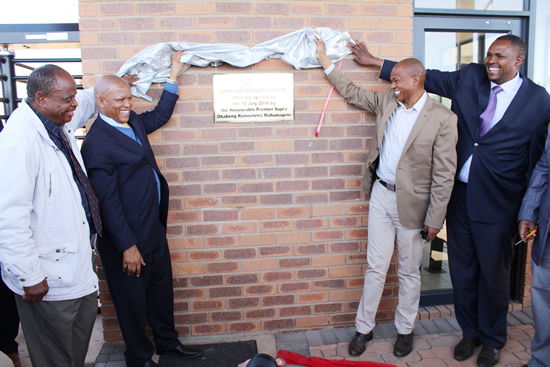 The hospital, which will serve the community of Ngaka Modiri Molema District Municipality, was opened in time to commemorate Mental Health Awareness Month in October.
The hospital, which will serve the community of Ngaka Modiri Molema District Municipality, was opened in time to commemorate Mental Health Awareness Month in October.
Speaking at the opening, Premier Mahumapelo said he was proud that this newly-built hospital makes a bold statement that the people in the province deserve the best in mental healthcare.
Some of the services offered include general psychiatry, acute care, medium- to long-term stay, forensic mental health services and mental observation.
Hospital staff will provide treatment in a structured setting with daily scheduled activities including medical and nursing care, social work services, individual and group therapy, health and nutrition education, support services, addiction services, peer counselling, recreation and physical exercise.
It will also provide short-stay treatment for local people with a range of mental health issues, including depression and anxiety.
MEC for Health Dr Magome Masike said such health facilities show government’s commitment to improving the health and well-being of citizens.
“This 158-bed facility has learning and education spaces for our clients; it offers a range of individual and group therapy and activity spaces all contained in this attractive building. Our people deserve the best services,” concluded MEC Masike.
Currently, there are four designated mental health hospitals in the province, namely: Bophelong Psychiatric Hospital in Mahikeng, Witrand Hospital in Potchefstroom, Job Shimankana Tabane in Rustenburg and Taung Hospital in Taung.
There are also hospitals which are able to render 72-hour mental health observation services while all the Community Health Centres and clinics in the province offer primary mental health services.
Take care of your mental health
Take care of your mental health Estelle GreeffThe month of October has been declared Mental Health Awareness Month to not only educate the public about mental health, but also reduce the stigma and discrimination that people with mental illness are often subjected to.
According to the Department of Health, mental health problems such as depression, anxiety, substance abuse and job stress are common, affecting individuals, their families and co-workers, and the broader community.
Very few South Africans seek treatment for their mental disorders. Mental illness can be treated at your nearest clinic, hospital or healthcare provider.
If you suspect a mental illness, visit your nearest clinic or doctor.
Electronic manufacturing to boost economy
Electronic manufacturing to boost economy Estelle GreeffCommunications Minister Faith Muthambi says the revival of the electronic manufacturing sector will help South Africa achieve the growth targets set out in the Nine-Point Plan.
 The Minister was speaking at an interactive session of the 1st Summit of the NexTV CEO Africa 2016 in Port Louis, Mauritius, recently.
The Minister was speaking at an interactive session of the 1st Summit of the NexTV CEO Africa 2016 in Port Louis, Mauritius, recently.
The two-day summit also looked at the “Africanisation” of TV content, with a special focus on sports rights. On the final day, there was a roundtable discussion on strategies to deal with piracy, advertising challenges and opportunities, as well as internet connectivity.
“As government, we are overwhelmed by the manner in which South Africans are embracing digital migration… South Africans… including those in the most remote areas, have shown us that they are aware that everyone on the African continent and in the entire world is going through a television revolution of migrating from analogue to digital broadcasting.
“While South Africans are indicating to us that they want to move away from the outdated analogue system, as government, we believe that one way of making our Nine-Point Plan a reality is to revive the manufacturing of television sets.”
South Africa has already begun the transition from analogue to digital terrestrial television broadcasting in the Square Kilometre Array (SKA) area in the Northern Cape and other border-lying provinces.
The Minister recently visited Xigalo village in Limpopo where she was invited by a local church to educate congregants about digital migration. She also used her visit to the rural village to distribute free set-top boxes (STBs), which were connected to analogue TV sets in poor households.
TV owners need to either acquire a STB to connect their analogue TV or purchase a digital television set, which has an inbuilt digital tuner. A set-top box is a device, which converts the signals from a digital television broadcast into a form which can be viewed on a traditional television set.
Government’s programme of distributing free STBs to five million households is currently underway.
Minister Muthambi said the digital migration a game changer for Africa, and that the continent must make the most of the opportunities presented by digital migration.
Jobs: Correctional Services Oct 2016
Jobs: Correctional Services Oct 2016 Estelle GreeffPrivate Bag X20530 , Bloemfontein , 9300 Agrimed Building, 103 Zastron Street, Bloemfontein, 9300, Tel 051 4040 2
Appointments under the Correctional Services Act
Head Correctional Centre
Free State and Northern Cape Region: Bizzah Makhate Medium C (DCS09/01)
Salary: R376 227 per annum
Centre Coordinator Operational Support
Free State and Northern Cape Region: Bizzah Makhate Centre A (DCS09/02) Salary: R376 227 per annum
Centre Coordinator Staff Support
Free State and Northern Cape Region: Upington (DCS09/03) Salary: R376 227 per annum
Centre Coordinator Staff Support
Free State and Northern Cape Region: Bizzah Makhate Community Corrections (DCS09/04) Salary: R315 084 per annum
Centre Coordinator Corrections
Free State and Northern Cape Region: Bizzah Makhate Medium C (DCS09/05) Salary: R315 084 per annum
DH Case Management
Free State and Northern Cape Region: Bizzah Makhate Medium B (DCS09/07) Salary: R315 084 per annum
Head Correctional Centre X 2
Free State and Northern Cape Region: Lindley (DCS09/08), Hopetown (DCS09/09) Salary: R315 084 per annum
Unit Manager
Free State and Northern Cape Region: Goedemoed Medium A (DCS09/10) Salary: R315 084 per annum
SH Production Workshop
Free State and Northern Cape Region: Tswelopele (DCS09/11) Salary: R315 084 per annum
Appointments under the Public Service Act
Area Coordinator Finance and Supply Chain Management
Free State and Northern Cape Region: AC Upington (DCS09/12) All-inclusive package: R612 822 per annum
Area Coordinator Corporate Services
Free State and Northern Cape Region: AC Grootvlei (DCS09/13) All-inclusive package: R612 822 per annum
Manager HR Support
Free State and Northern Cape Region: AC Upington (DCS09/14) Salary: R311 784 per annum
Manager Education and Training
Free State and Northern Cape Region: AC Bizzah Makhate (DCS09/15) Salary: R342 753 per annum
Manager Spiritual Care
Free State and Northern Cape Region: AC Goedemoed (DCS09/16) Salary: R311 784 per annum
SAO Transport
Free State and Northern Cape Region: AC Grootvlei (DCS09/17) Salary: R262 272 per annum
SAO Accounting & Bookkeeping
Free State and Northern Cape Region: Regional Office (DCS09/18) Salary: R262 272 per annum
AO Accounting Systems
Free State and Northern Cape Region: Regional Office (DCS09/19) Salary: R211 194 per annum
Clinical Nurse Practitioner: PHC X 4
Free State and Northern Cape Region: Bizzah Makhate Medium A (DCS09/20), Goedemoed Med A (DCS09/21), Tswelopele (DCS09/22), De Aar (DCS09/23) Salary: R317 271 per annum
Social Workers Grade 1 X 3
Free State and Northern Cape Region: Goedemoed Medium B (DCS09/24), Kimberley Community Corrections (DCS09/25), Tswelopele (DCS09/26) Salary: R211 263.00 per annum
Artisan Foreman: Grade A (Plumber X 2)
Free State and Northern Cape Region: Bizzah Makhate (DCS09/27), Goedemoed (DCS09/28) Salary: R249 540 per annum
Artisan Foreman: Grade A (Electrician X 3)
Free State and Northern Cape Region: Bizzah Makhate (DCS09/29), Goedemoed (DCS09/30), Grootvlei (DCS09/31) Salary: R249 540 per annum
Artisan Foreman: Grade A (Welder)
Free State and Northern Cape Region: Goedemoed (DCS09/32) Salary: R249 540 per annum
Artisan Foreman: Grade A (Carpenter)
Free State and Northern Cape Region: Goedemoed (DCS09/33) Salary: R249 540 per annum
Artisan Foreman: Grade A (Bricklayer)
Free State and Northern Cape Region: Bizzah Makhate (DCS09/34) Salary: R249 540 per annum
Artisan Foreman: Grade B: Production Workshop
Free State and Northern Cape Region: Bizzah Makhate (DCS09/35) Salary: R301 4700 per annum
Artisan Foreman: SH Maintenance
Free State and Northern Cape Region: Bizzah Makhate (DCS09/36) Salary: R301 470 per annum
Artisan Production: Grade A: Plumber X 2
Free State and Northern Cape Region: Bizzah Makhate (DCS09/37) Salary: R156 363 per annum
Artisan Production: Grade A: Carpenter
Free State and Northern Cape Region: Bizzah Makhate (DCS09/38) Salary: R156 363 per annum
Artisan Production: Grade A: Welder
Free State and Northern Cape Region: Bizzah Makhate (DCS09/39) Salary: R156 363 per annum
DH Education X 2
Free State and Northern Cape Region: Tswelopele (DCS09/40) Salary: R342 753 per annum
Formal Educationist: M+4
Free State and Northern Cape Region: Douglas (DCS09/41) Salary: R228 981 per annum
Formal Educationist (Skills Development): M+4
Free State and Northern Cape Region: Upington (DCS09/42) Salary: R228 981 per annum
Closing date: 28 October 2016 @ 15H45
Note: Before you apply: All costs associated with an application will be borne by the applicant. The Department of Correctional Services is an equal opportunity employer. The Department will take into consideration the objectives of Section 195 (1) (i) of the Constitution of the Republic of South Africa, 1996 (Act 108 of 1996) and the Employment Equity Act, 1998 (Act 55 of 1998) in filling of these vacancies. It is our intention to promote representivity in respect of race, gender and disability through the filling of these positions. In support of this strategy, applicants need to indicate race, gender and disability status on the application form/CV. Applicants who have retired from the Public Service with a specific determination that they cannot be re-appointed or have been declared medically unfit will not be considered.
Please take note that correspondence will only be conducted with the shortlisted candidates. If you have not been contacted within three (3) months of the closing date of the advertisement, please accept that your application is unsuccessful.
Applicants must note that further checks will be conducted once they are shortlisted and that their appointment is subject to positive outcomes on these checks, which include security clearance, security vetting, qualification verification, and criminal records verification. Appointment to some of these posts will be provisional, pending the issue of a security clearance. If you cannot get a security clearance, your appointment will be re-considered/possibly terminated. Finger prints may be taken on the day of interviews.
The Department of Correctional Services reserves the right not to fill any of these advertised posts.
Applications: Applications must be submitted on form Z83 (Public Service Application form), obtainable from any Public Service Department, and must be completed in full. Applications must be accompanied by a CV, certified copies of qualifications and ID NOT older than 3 months. Where an advertisement states that a valid Driver’s Licence is required, then please submit a certified copy of your licence. Please send a separate and complete application for each post you apply for, stating the correct reference for each position you are interested in. Faxed and e-mailed applications will not be accepted — Candidates must comply with the minimum appointment requirements — CV’s should be aligned to reflect one’s degree of compliance with the above-mentioned requirements and responsibilities. Applications must reach DCS before the closing date and time. It is the sole responsibility of an applicant to ensure that their application reaches DCS before the stipulated closing date and time.
NB: Indicate the reference number and position you are applying for on your application form (Z83) and post your complete application to the address as indicated below:
Free State/Northern Cape Region: Postal Address: Head Recruitment, Private Bag X20530, Bloemfontein, 9300 Contact person: Ms. Mkuni NJ & Mr. Monare KE at 051 404 0270 or 051 4040283 Physical Address: 103 Zastron Street, Agrimed Building, Bloemfontein
For the requirements to apply for these positions please visit the DCS Web: www.dcs.gov.za and check under Vacancies.
More information about government jobs
Jobs: Department of Women
Jobs: Department of Women Estelle GreeffFull details of the advertisements and the application process are available from the Department’s website www.women.gov.za or DPSA Vacancy Circular www.dpsa.gov.za.
Interested applicants who meet the post requirements and security vetting criteria are invited to apply for the following positions:
Chief Director: Governance Transformation, Justice and Security
Reference: DOW/08/2016
Salary package: R1,068,564 per annum (salary level 14)
Centre: National Office, Pretoria
Purpose of the post: to ensure policies and programmes that mainstream women’s equality in the public sector, and eliminate gender-based violence.
Requirements for the post: appropriate postgraduate degree in Social Sciences, Development Sciences or relevant NQF 8 qualification PLUS 12 years relevant experience of which 5 years were in senior management PLUS proven experience in gender activism; government policies & programmes analysis and consolidation; government matters related to gender as well as gender mainstreaming.
Director: Communications
Reference: DOW/09/2016
Salary package: R898,743 per annum (salary level 13)
Centre: National Office, Pretoria
Purpose of the post: to provide communication services and manage the corporate brand of the Department.
Requirements for the post: appropriate NQF 7 qualification in Communication, Marketing or related field PLUS minimum of ten (10) years experience in the field of gender activism, public relations and communications of which five (5) years were in middle management PLUS proven experience in the management of communication services related to gender mainstreaming and corporate branding.
Enquiries: Mr Mbhazima Shiviti 012 359 0262
Closing date: 21 October 2016
More information about government jobs
Bursaries: Independent Development Trust 2017
Bursaries: Independent Development Trust 2017 Estelle Greeff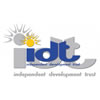 The IDT is a social infrastructure programme management agency in the public sector. The organisation plays a vital role in ensuring that the country develops built environment professionals. The organisation provides opportunities to matriculants and tertiary level students who would like to pursue studies in the built environment. The bursary is offered to South African citizens from all the provinces and across all race groups with emphasis on the historically disadvantaged groups and people living with disabilities.
The IDT is a social infrastructure programme management agency in the public sector. The organisation plays a vital role in ensuring that the country develops built environment professionals. The organisation provides opportunities to matriculants and tertiary level students who would like to pursue studies in the built environment. The bursary is offered to South African citizens from all the provinces and across all race groups with emphasis on the historically disadvantaged groups and people living with disabilities.
The bursary programme is offered in the following fields of studies:
- Civil Engineering
- Quantity Surveying
- Architect
- Construction and Building Management
- OHS /SHEQ
The bursary covers:
- Tuition and registration
- University accommodation
- Meals
- Book fees.
NB: The organisation will advise the student on the cap for accommodation, meals and book fees.
The application letters should be accompanied by:
- South African Identity Document
- Proof of residence
- Grade11 year-end report for those currently in Matric or first semester results for students who are already at University or University of Technology
- Parents’ proof of income/affidavit if not working.
Completed application letters and supporting documents should be returned to: The HRD Consultant, Human Resource Development, Independent Development Trust, PO Box 73000, Lynnwood Ridge 0043 OR e-mail to: externalbursaries@idt.org.za
Closing date for submission of applications is 31 October 2016.
NB: Only short-listed candidates will be contacted.
The IDT is a Schedule 2 Public Entity, established as a development management agency. Its primary role is to influence, support and add value to the national development agenda. The IDT is mandated to measurably impact on the eradication of poverty and to improve the quality of life of poor, rural and marginalised communities.
Persons with disabilities are encouraged to apply
www.humanjobs.co.za - Human Communications 130347
More information about government jobs
Over 17 million receive social grants
Over 17 million receive social grants JoyMore than 17 million poor South Africans are benefitting from government’s security net through social grants, Basic Education Minister Angie Motshekga said.
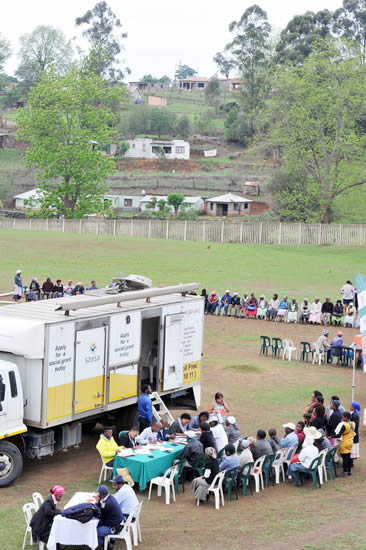 The Minister said this when she led a briefing of the Social Protection, Community and Human Development Cluster. She gave an update on the progress made in the implementation of the cluster’s Programme of Action towards achieving the goals of the National Development Plan (NDP): Vision 2030.
The Minister said this when she led a briefing of the Social Protection, Community and Human Development Cluster. She gave an update on the progress made in the implementation of the cluster’s Programme of Action towards achieving the goals of the National Development Plan (NDP): Vision 2030.
“Through the Social Assistance Programme, which is part of the country’s Social Protection System, more than 17 million poor South Africans are receiving social grants from the South African Social Security Agency (SASSA) to the value of R10 billion per month.
“It is also worth noting that this year, SASSA is celebrating 10 years of existence.”
The Minister said the NDP has set a target to eradicate absolute poverty – from 39 percent of people living below the poverty line to zero by 2030.
She said the target is a challenging goal and yet one that must be faced head on as government sets to deliver on its promise.
“Government is continuing to improve the living conditions of poor, vulnerable and underprivileged South Africans.
“These include unemployed South Africans as well as orphaned and vulnerable children living in child-headed households.
“We do this as part of our response to the current economic downturn which is affecting all of us,” she said.
Government strengthens social support
Government strengthens social support JoyGovernment will open more facilities in four provinces to deal with substance abuse challenges.
Minister of Basic Education Angie Motshekga, who is also the chairperson of the Social Protection, Community and Human Development Cluster, said government is working to address the shortage of treatment centres in the country.
Currently, there are seven public substance abuse treatment centres but they are not ideally located to serve all provinces.
“We are in the process of establishing six additional treatment centres to ensure that each province has at least one public treatment facility. In the current financial year, government plans to open treatment centres in the Eastern Cape, North West, Limpopo and Free State.”
The Minister also highlighted the success of the Gender-Based Violence Command Centre (GBVCC).
Since January, the centre has received over 30 000 calls and provided telephonic counselling to thousands of victims of gender-based violence.
“These calls dealt with varied types of gender-based violence, such as domestic violence, rape, physical abuse, indecent assault, verbal abuse and intimidation, as well as abandoned children.”
Minister Motshekga added that for the country to defeat gender-based violence, all stakeholders should work together.
“It is critical to emphasise that gender-based violence can only be eradicated through collaborative efforts in all sectors of society.”
South Africans can call the GBVCC on 0800 428 428 or dial *120*7867# on their cell phones to be contacted by a social worker.
Home Affairs reopens office in Thaba Nchu
Home Affairs reopens office in Thaba Nchu JoyAfter years of surviving without a Home Affairs office, the community of Thaba Nchu in the Mangaung Metropolitan Municipality now has a reason to smile again. This is after the Home Affairs office in the rural area was reopened.
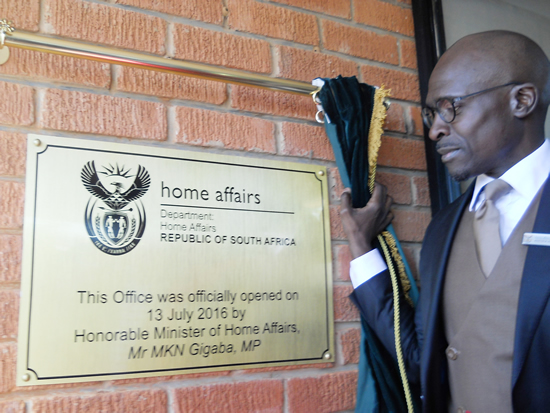 Speaking at the official opening, Minister of Home Affairs Malusi Gigaba said his department provides essential services.
Speaking at the official opening, Minister of Home Affairs Malusi Gigaba said his department provides essential services.
“The significance of this office is that it brings services closer to the people, especially those who are in the outlying areas. Many of our people are unemployed and rely on social grants, therefore the closer we can get to them, the better for us,” said Minister Gigaba.
Praising Home Affairs officials, the Minister said that they are beginning to understand the message that he has been communicating.
“The message is to serve our people to the best of your ability, professionally, efficiently and with respect. This is government as it should be,” he said.
He added that the compliments his department gets are thanks to his dedicated officials.
The Department of Home Affairs has to date opened offices in the Eastern Cape, KwaZulu-Natal and the Free State.
Minister Gigaba called on provincial departments of Public Works to assist the Department of Home Affairs with physical infrastructure to increase the department’s footprint in the country.
MEC for Public Works in the Free State, Dora Kotzee said it was important for government departments to work together.
“Working with other departments and stakeholders, this is proof of the effectiveness and efficiency of good inter-governmental relations between all organs of the state,” said MEC Kotzee during the opening.
Resident Alisa Seepamore (78) was grateful for the new office. “We used to struggle because we had to travel to other towns to access a Home Affairs office but now I’m happy.”
Govt stamps out corruption
Govt stamps out corruption JoyThe National Anti-Corruption Hotline (NACH) has helped government to recover over R300 million from corrupt public servants.
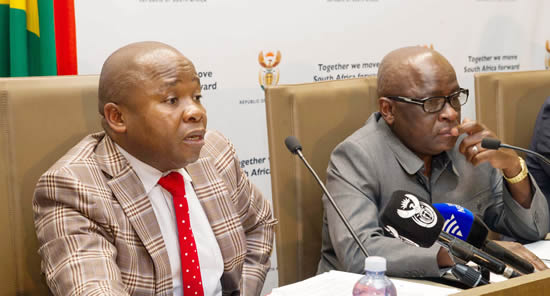 Public Service and Administration Minister Advocate Ngoako Ramatlhodi said by the end of August 2016, over 18 000 cases were referred to departments, feedback on 16 752 cases was received and of the total number of cases referred, 16 547 were closed.
Public Service and Administration Minister Advocate Ngoako Ramatlhodi said by the end of August 2016, over 18 000 cases were referred to departments, feedback on 16 752 cases was received and of the total number of cases referred, 16 547 were closed.
“The closure rate underscores a commitment by departments to investigate allegations of corruption as reported through the NACH.”
Since the inception of the NACH, 3 570 officials were found guilty of misconduct related to corrupt activities. All tip-offs came via the NACH.
The following are the types of sanctions taken against officials who were charged and found guilty of misconduct between 1 September 2004 and August 2016:
- 1 694 officials were dismissed from the public service.
- 438 officials were fined (e.g. not receiving a salary for three months).
- 133 officials were demoted.
- 913 officials were given final written warnings.
- 392 officials were prosecuted.
Minister Ramatlhodi added that by 2017, all public servants should have declared all their business interests.
“A circular has already been issued for public servants to disclose their business activities involving any organ/s of state and that such employees should, by January 2017, make a decision either to resign from the public service or relinquish their business activities.”
In an effort to skill public servants, the National School of Government (NSG) has trained 312 officials who are responsible for capacitating councillors at local government level.
“The NSG is implementing the Breaking Barriers programme aimed at capacitating graduates who do not have the experience of working in the public sector.
“This programme is aimed at removing barriers that make it difficult for graduates to be employable in the public service.”
SA takes lessons from Vietnam
SA takes lessons from Vietnam JoyInternational relations
Deputy President Cyril Ramaphosa recently led a South African delegation to take lessons on how government can develop the country and reduce poverty.
The official visit to Vietnam is expected to strengthen bilateral political, economic and trade relations between the two countries.
The visit is being used to explore possibilities of breaking into new areas of trade and investment to help reverse trade imbalances between South Africa and Vietnam.
One of south-east Asia's fastest growing economies, Vietnam, offers great trading opportunities for South African companies particularly in transport, mining, road and infrastructure and the defence industry.
“Being here means we have come to learn how you have succeeded in developing your own country. You have been able to reduce poverty in your own country. You have been able to industrialise your country, and the success that you have achieved in Vietnam is a success that we have noticed and we would also like to get to,” said Deputy President Ramaphosa.
Among others the Deputy President held bilateral discussions with his counterpart Vice President Ðặng Thịnh.
They exchanged views on how to deepen cooperation on defence matters, as well as addressing the trade deficit. The two sides indicated that they are looking at the agricultural sector, where South African agricultural products can be exported to Vietnam, particularly beef. This cooperation, Deputy President Ramaphosa said, can extend to mining products.
“… We discussed how South Africa should look at Vietnam as the gateway into the Asian countries trade market. We also expressed a wish that Vietnam should keep South Africa as the gateway into Africa,” he said.
Bilateral trade between the two countries has grown significantly from R13.4 billion to R18.5 billion in 2015, making Vietnam the fourth largest trading partner of South Africa in the Asian region.
On the education front, parties committed to extended scholarships for South African youth to go to Vietnam to learn about the ocean economy, particularly shipbuilding.
Know your Minister
Know your Minister JoyMinister Dipuo Peters is the Minister of Transport, a position she has held since July 2013.
About the Minister
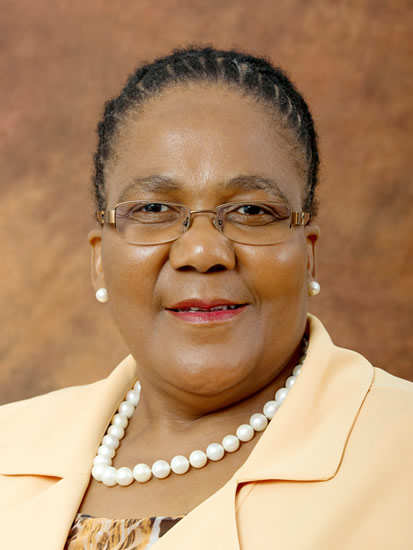 Minister Peters hails from Kimberley, in the Northern Cape, where she underwent schooling at Tidimalo Junior Secondary and Tshireleco Senior Secondary School.
Minister Peters hails from Kimberley, in the Northern Cape, where she underwent schooling at Tidimalo Junior Secondary and Tshireleco Senior Secondary School.
She obtained a Bachelors’ Degree in Social Work from the then University of the North and a Certificate in Development and Public Policy from the University of the Western Cape. She also obtained a Certificate in Executive Management from the University of Cape Town’s Graduate School of Business and a Certificate in International Policy Management from Havana, Cuba.
Minister Peters served in the National Assembly between 1994 and 1997, serving in the Parliamentary Portfolio Committees of Home Affairs, Public Works, Social Services and Health. In 1997, Minister Peters was redeployed to the Northern Cape Provincial Legislature, executing the duties of Chief Whip until 1999.
Minister Peters also served as the Northern Cape MEC for Health from 1999 to 2004, spearheading among others, the revitalisation of the Kimberley Hospital Complex and overseeing the extension of primary healthcare and maternal health services in the Northern Cape.
In 2004, she was appointed to serve as Premier of the Northern Cape until May 2009, before being appointed Minister of Energy.
About the Department
The Department of Transport is responsible for spearheading the development of integrated efficient transport systems by creating a framework of sustainable policies, regulations and implementable models to support government strategies for economic, social and international development.
Indigenous Games SA’s rich culture
Indigenous Games SA’s rich culture JoySport, arts & culture
The township of Seshego outside Polokwane in Limpopo came alive as multitudes of artists and dancers from different cultures danced away in the streets to mark the opening of the 11th Indigenous Games.
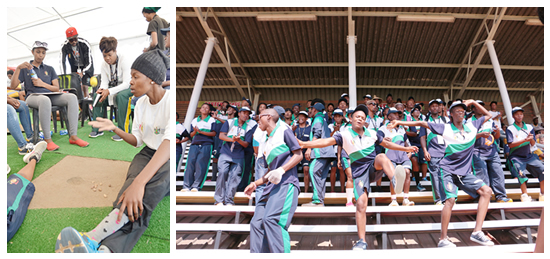 Minister of Sports and Recreation Fikile Mbalula, who was part of the festivities, said the games celebrate the rich history of the diverse cultures of South Africa.
Minister of Sports and Recreation Fikile Mbalula, who was part of the festivities, said the games celebrate the rich history of the diverse cultures of South Africa.
The Indigenous Games Festival campaign aims to promote social cohesion and nation building and celebrate the country’s rich history, heritage and culture.
Through the games South Africans get a chance to compete in under profiled sporting codes that brings diverse cultures together.
“The games allow us to celebrate our unique South African diversity through sport. As we all know, sport is a great tool for social cohesion, we will continue using it to unite the people of this great country we call Mzantsi.”
Among the games played at the competition were ncuba, morabaraba, jukskei, kgati, driestokkies and dibeke.
He added that South Africans should never forget who they are.
At this year’s games, KwaZulu-Natal emerged as the 2016 champions. The province succeeded in defending the title they won in the 2015 games.
The 2016 games were not all about playing games. Arts and crafts sellers as well as fashion designers were also given an opportunity to exhibit their products.
Gauteng honours sports stars
Gauteng honours sports stars JoySport, arts & culture
It was a night of glamour and purpose, as hundreds gathered at the Silverstar Casino in Mogale City to recognise Gauteng’s sports stars. Over 800 guests walked the black carpet during the glitzy ceremony to celebrate the champions of the province.
The sixth edition of the Gauteng Sport Awards 2016 saw cricketer Kagiso Rabada claiming the title of Sportsman of the Year and athlete Ayssa Conley taking Sportswoman of the Year.
Each finalist received R5 000 while every winner per category received R15 000. The Sport Personality Award winner was awarded R45 000 while the Life Time Achiever Award recipient received R50 000.
Read more about the winners in the next edition of Vuk’uzenzele.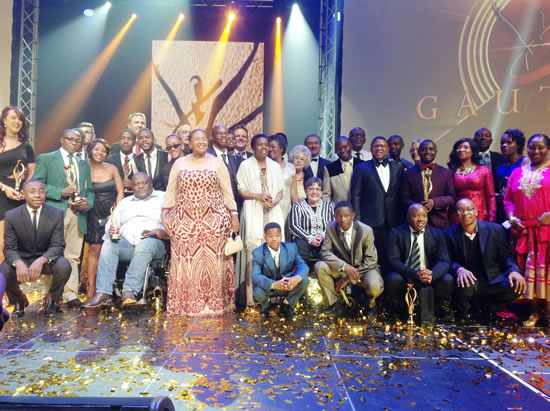
Here are the winners:
Sportswoman of the Year with a disability
Zandile Nhlapo for javelin & shot-put.
Sportsman of the Year with a disability
Ntando Innocent Mahlangu for Athletics: 100m, 200m, 400m, and 800m.
Sports Team of the Year with a disability
Central Gauteng Blind Cricket Team for cricket.
Administrator of the Year
Karen Losch for wheelchair tennis.
Coach of the Year
Geoffrey Toyana for cricket.
Most Promising team of the Year
Pretoria Technical High School 1st Team Rugby for Rugby.
Sports team of the Year
Xerox Golden Lions Currie Cup Team 2015.
Most promising player/athlete
Siphamandla Hadebe for volleyball.
Sports journalists of the Year
Charles Baloyi for Daily Sun/Sunday Sun.
Technical official of the Year
Mpho Makhoba for Tennis.
Community media of the Year
Tshepo Thafeng for Soweto TV.
School sport athlete of the Year
Nokwande Hlongwane for Wheelchair Tennis SA/Adelaide Tambo School.
Community sport and recreation programme of the Year
Johannesburg Spikers Volleyball Academy for volleyball.
Lifetime Achievement Award
Mme Rosina Sedibane
Sport Fan of the Year
William Mukwevho
Sport Programme of the Year
Sportsbuzz- SABC1
Sport Personality of theYear
Andrea Dalle Ave for athletics
Sportsman of the Year
Kagiso Rabada
Sportswoman of the Year
Alyssa Conley
*Rofhiwa Marubini-Tshitahe works for Office of the Premier in Gauteng.
